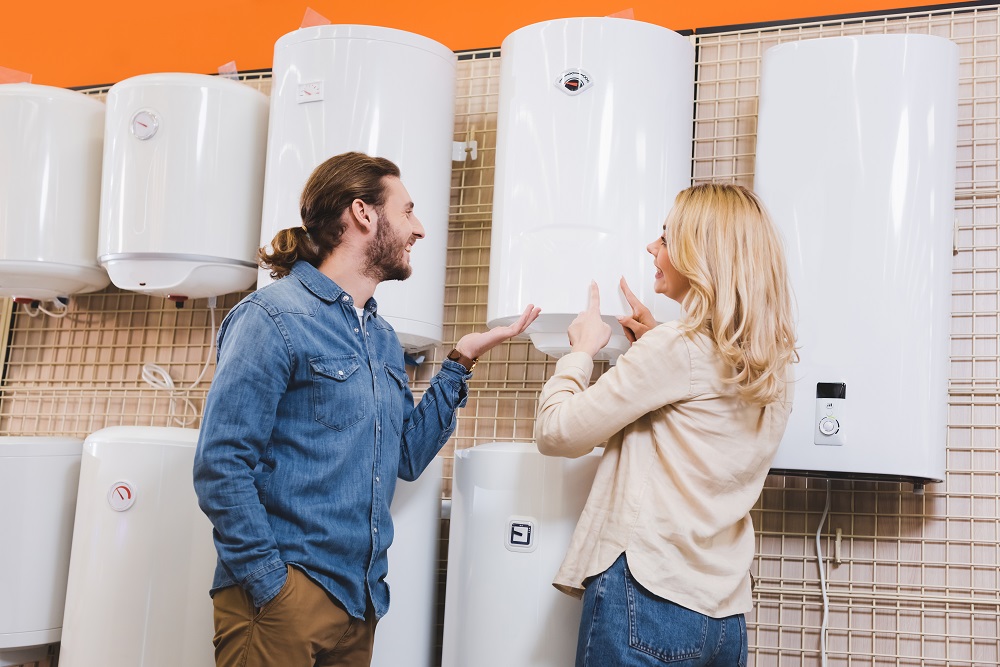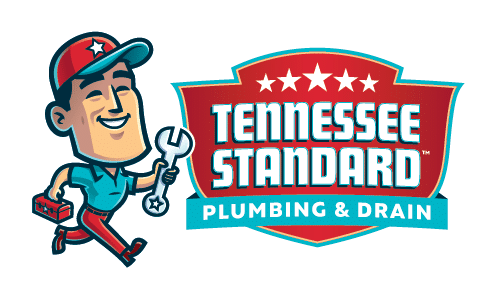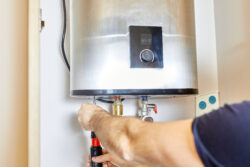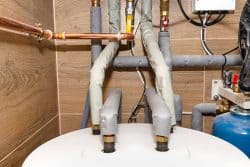
Table of Contents
- Why Professional Installation is Critical for Tankless Water Heaters
- Pre-Installation Assessment Requirements
- Electrical Installation Requirements
- Gas Installation Requirements
- Water Supply and Plumbing Considerations
- Get Professional Tankless Installation Done Right
Installing a tankless water heater isn’t as simple as swapping out your old tank unit. Proper installation requires precise electrical work, gas line modifications, code compliance, and professional expertise to ensure safe, efficient operation. One installation mistake can lead to system failures, safety hazards, and voided warranties.
At Tennessee Standard Plumbing, we’ve completed countless tankless water heater installations throughout Knoxville, and we understand exactly what it takes to get your system running properly from day one. Our full installation process makes sure that your tankless water heater meets all local codes and gives you the energy savings and hot water you need.
Call us for any plumbing needs.
Why Professional Installation is Critical for Tankless Water Heaters
Tankless water heaters require significantly more complex installation than traditional tank units. Unlike simple tank replacements, tankless systems often involve infrastructure upgrades, new venting systems, and precise integration with your home’s electrical and gas systems.
Professional installation protects three critical aspects of your investment: safety compliance with local codes, optimal system performance, and warranty validity. Attempting DIY installation or hiring unqualified contractors can result in code violations, poor performance, and voided manufacturer warranties that leave you financially exposed.
Pre-Installation Assessment Requirements
Comprehensive Home Evaluation
Before any installation begins, we conduct a thorough evaluation of your home’s infrastructure to determine compatibility and identify necessary upgrades.
- Electrical System Assessment: We evaluate your current electrical capacity to determine if upgrades are needed to safely power your new system. Many older homes require electrical modifications to support tankless operation.
- Water Pressure and Flow Testing: Tankless units need minimum water pressure to activate properly. We test your home’s water pressure and flow rates to ensure optimal performance and identify any pressure-boosting requirements.
- Existing Plumbing Infrastructure: Our assessment includes reviewing your current hot water distribution system, pipe sizes, and connection points to determine necessary modifications for seamless integration.
Strategic Location Selection
- Indoor vs. Outdoor Considerations: Indoor tankless units require adequate clearance for ventilation and maintenance access while meeting local building codes. Outdoor units eliminate venting requirements and save indoor space but require freeze protection specific to Tennessee’s winter conditions.
- Maintenance Access Planning: Strategic placement ensures technicians can easily access your unit for annual maintenance, filter changes, and repairs without disrupting your daily routine.
Accurate Sizing and Capacity Planning
- Hot Water Demand Calculation: We analyze your family’s peak hot water demand by examining simultaneous usage patterns, including shower flow rates, dishwasher requirements, washing machine needs, and other hot water appliances operating concurrently.
- Temperature Rise Considerations: Incoming water temperature varies seasonally in Knoxville, affecting the energy required to reach desired hot water temperatures. We factor these variations into sizing calculations to ensure consistent year-round performance.
- Multiple Unit Solutions: Large homes or high-demand households may benefit from multiple tankless units strategically placed throughout the home, providing zone-based hot water delivery and eliminating long wait times.
Electrical Installation Requirements
Power and Circuit Requirements
Electric tankless water heaters demand substantial electrical power to operate multiple high-wattage heating elements simultaneously. Most units require dedicated electrical circuits to handle this power draw without affecting other household electrical systems.
- Dedicated Circuit Installation: Each tankless unit needs its own dedicated electrical circuit. Sharing circuits can cause voltage drops, reduced performance, and potential safety hazards.
- Electrical Panel Evaluation: Many homes require electrical panel upgrades to safely accommodate tankless units alongside existing electrical loads. Our electricians assess your current capacity and recommend necessary upgrades.
Code Compliance and Safety Standards
- Local Code Requirements: We ensure all electrical work meets Tennessee’s electrical codes and specific requirements for water heater installations. Our licensed electricians guarantee code compliance and successful inspection approval.
- Permit and Inspection Coordination: We handle all necessary permits and coordinate inspections to ensure smooth approval processes and avoid costly corrections.
Gas Installation Requirements
Gas Line Specifications and Sizing
Gas tankless water heaters require more fuel than traditional tank units to heat water instantly on demand. This means your existing gas lines may need to be upgraded to deliver adequate gas flow to your new system.
- Gas Supply Assessment: We evaluate whether your current gas lines can handle the increased demand of a tankless unit. Many homes need larger gas lines installed to ensure proper performance and prevent issues.
- Gas Meter Evaluation: Your existing gas meter must be able to supply enough gas for your tankless unit plus all your other gas appliances. If your meter is too small, the utility company will need to upgrade it before installation.
- Safety Requirements: Local codes require easily accessible gas shut-off valves near tankless units so gas can be quickly disconnected for maintenance or in emergencies.
Venting Requirements and Systems
- Direct Vent Systems: Most modern tankless units use direct vent systems that bring combustion air from outside while exhausting combustion gases through dedicated vent pipes.
- Vent Pipe Specifications: Vent pipes must be properly sized for the unit’s BTU output and use approved materials resistant to condensation and corrosion. Stainless steel or approved PVC materials are typically required.
- Clearance Requirements: Vent terminations must maintain specific distances from windows, doors, air intakes, and property lines to prevent combustion gas infiltration.
- Condensate Drainage: Gas tankless units produce condensate requiring proper drainage to prevent water damage. Condensate lines must connect to appropriate drainage systems or condensate pumps.
Water Supply and Plumbing Considerations
Plumbing Connection Requirements
- Water Line Sizing: Tankless units require adequate water line sizing to achieve optimal flow rates. Undersized supply lines restrict flow and reduce system performance.
- Isolation Valve Installation: We install isolation valves on both hot and cold water lines, enabling easy system shutdown for maintenance without affecting other household water supplies.
- Pressure Relief Valve Requirements: Tankless units require temperature and pressure relief valves to prevent dangerous pressure buildup. These safety devices must be properly installed and piped to safe discharge locations.
Get Professional Tankless Installation Done Right
Installing a tankless water heater is a significant investment that requires professional expertise to ensure safety, efficiency, and optimal performance. Our experienced team handles every aspect of installation, from initial assessment to final testing and customer education.
Ready to upgrade to tankless water heating? Contact Tennessee Standard Plumbing today to schedule your home assessment or to learn more about our services in Knoxville. We’ll evaluate your requirements, explain what’s needed, and provide a detailed cost estimate for your project.
Don’t risk your investment with inadequate installation. Choose the professionals who deliver the expertise and endless hot water your family deserves.



